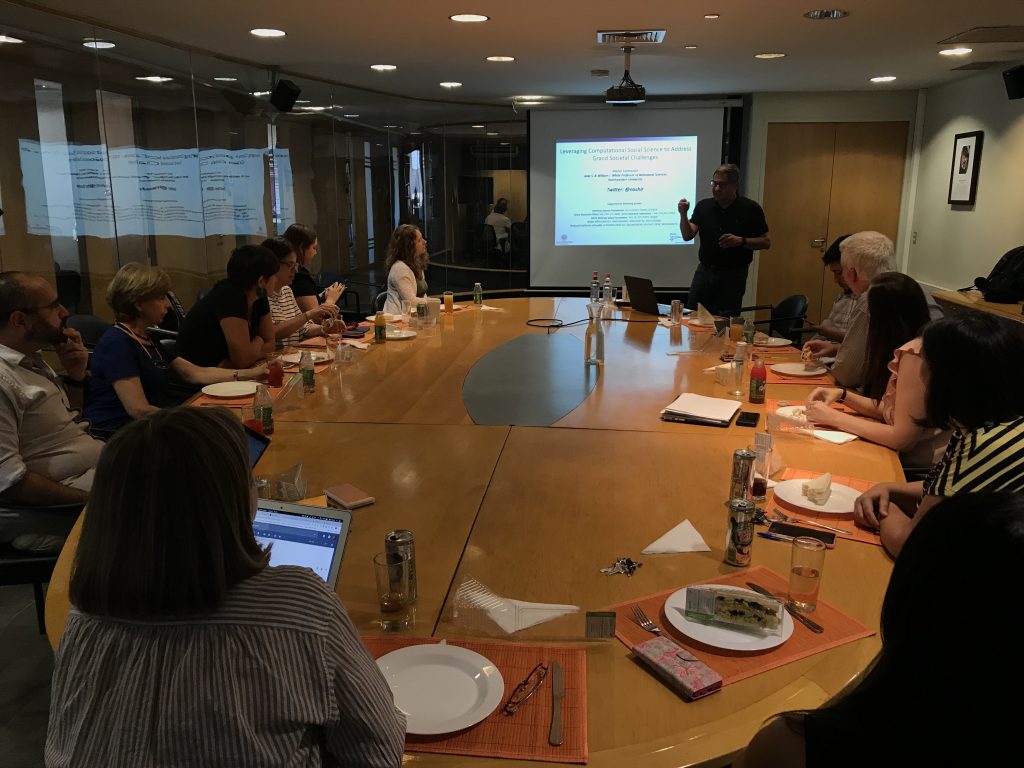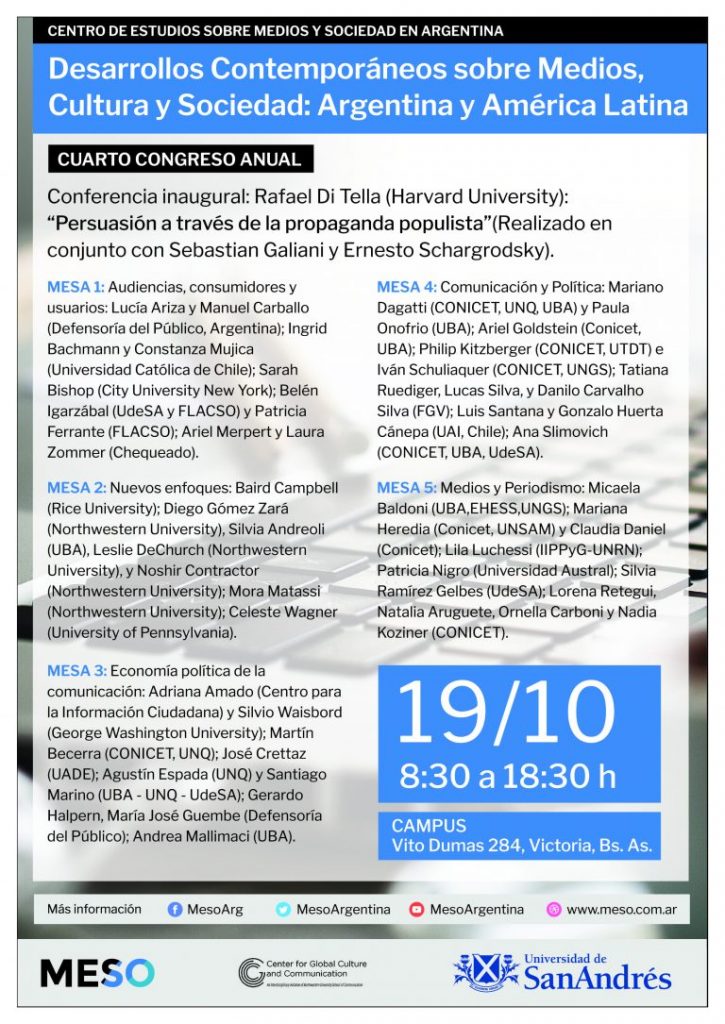On December 12th, Prof. Noshir Contractor presented two research articles at the 8th International Conference on Complex Networks and their Applications, Lisbon, Portugal.
Citations
On December 12th, Prof. Noshir Contractor presented two research articles at the 8th International Conference on Complex Networks and their Applications, Lisbon, Portugal.
Citations
Diego Gómez-Zará, one of our Ph.D. students, will present with Alexa Harris their work “Joining Together Online: The Trajectory of CSCW Scholarship on Group Formation.” This paper consists of a systematic literature review of CSCW scholarship on group formation. Their presentation will be on November 12th, in Austin, Texas.
Citation:
Harris, Alexa M., Diego Gómez-Zará, Leslie A. DeChurch, and Noshir S. Contractor. 2019. “Joining Together Online: The Trajectory of CSCW Scholarship on Group Formation.” Proceedings of the ACM on Human-Computer Interaction 3 (CSCW): 148. http://doi.acm.org/10.1145/3359250
This study explores how and why scholars find collaborators using team formation systems. Based on theories of teams and human and social capital, we describe how scholars’ traits and social networks influence their team formation processes. We conducted a field study in Argentina in which 43 scholars used an online platform and assembled into eight interdisciplinary teams. Our results show that scholars initially tended to invite prior contacts connections, but eventually, they assembled cohesive interdisciplinary teams with members they did not know before. We conclude by reflecting on how team formation platforms can enable individuals to expand their social capital.
Citation: Gómez-Zará, D., Andreoli, S., DeChurch, L. A., & Contractor, N. S. (2019). Discovering collaborators online: Assembling interdisciplinary teams online at an Argentinian University. Cuadernos.Info, (44), 21-41. https://doi.org/10.7764/cdi.44.1575
Citation
Diego Gómez-Zará, Matthew Paras, Marlon Twyman, Jacqueline N. Lane, Leslie A. DeChurch, and Noshir S. Contractor. 2019. Who Would You Like to Work With?: Use of Individual Characteristics and Social Networks in Team Formation Systems. In CHI Conference on Human Factors in Computing Systems Proceedings (CHI 2019), May 4–9, 2019, Glasgow, Scotland Uk. ACM, New York, NY, USA, 15 pages. https://doi.org/10.1145/3290605.3300889
A research article by Lingfei Wu, Dashun Wang, and James A. Evans.
One of the most universal trends in science and technology today is the growth of large teams in all areas, as solitary researchers and small teams diminish in prevalence. Increases in team size have been attributed to the specialization of scientific activities3, improvements in communication technology, or the complexity of modern problems that require interdisciplinary solutions. This shift in team size raises the question of whether and how the character of the science and technology produced by large teams differs from that of small teams. Here we analyse more than 65 million papers, patents and software products that span the period 1954–2014, and demonstrate that across this period smaller teams have tended to disrupt science and technology with new ideas and opportunities, whereas larger teams have tended to develop existing ones. Work from larger teams builds on more-recent and popular developments, and attention to their work comes immediately. By contrast, contributions by smaller teams search more deeply into the past, are viewed as disruptive to science and technology and succeed further into the future—if at all. Observed differences between small and large teams are magnified for higher-impact work, with small teams known for disruptive work and large teams for developing work. Differences in topic and research design account for a small part of the relationship between team size and disruption; most of the effect occurs at the level of the individual, as people move between smaller and larger teams. These results demonstrate that both small and large teams are essential to a flourishing ecology of science and technology, and suggest that, to achieve this, science policies should aim to support a diversity of team sizes.
Link: https://www.nature.com/articles/s41586-019-0941-9
Paper by Nir Grinberg, Kenneth Joseph, Lisa Friedland, Briony Swire-Thompson, and David Lazer
The spread of fake news on social media became a public concern in the United States after the 2016 presidential election. We examined exposure to and sharing of fake news by registered voters on Twitter and found that engagement with fake news sources was extremely concentrated. Only 1% of individuals accounted for 80% of fake news source exposures, and 0.1% accounted for nearly 80% of fake news sources shared. Individuals most likely to engage with fake news sources were conservative leaning, older, and highly engaged with political news. A cluster of fake news sources shared overlapping audiences on the extreme right, but for people across the political spectrum, most political news exposure still came from mainstream media outlets.
Link: http://science.sciencemag.org/content/363/6425/374
A My Dream Team paper titled “Who Would You Like to Work With? Use of Individual Characteristics and Social Networks in Team Formation Systems,” was accepted at the ACM Conference on Human Factors in Computing Systems Proceedings (CHI).
In this paper, we conducted a field study where 530 participants used a team formation system to assemble project teams. We describe how users’ traits and social networks influence their teammate searches, teammate choices, and team composition. Our results show that (a) what users initially search for differs from what they finally choose: initially they search for experts and sociable users, but they are ultimately more likely to choose their prior social connections; (b) users’ decisions lead to non- diverse and segregated teams, where most of the expertise and social capital are concentrated in a few teams.
Citation: Diego Gómez-Zará, Matthew Paras, Marlon Twyman, Jacqueline N. Lane, Leslie A. DeChurch, and Noshir S. Contractor. 2019. Who Would You Like to Work With?: Use of Individual Characteristics and Social Networks in Team Formation Systems. In CHI Conference on Human Factors in Computing Systems Proceedings (CHI 2019), May 4–9, 2019, Glasgow, Scotland Uk. ACM, New York, NY, USA, 15 pages. https://doi.org/10.1145/3290605.3300889

Contractor, N. (2019, January). “Avances y proyecciones de Computational Social Sciences”. Presented at the Ponticia Universidad Católica de Chile, Facultad de Comunicaciones, Santiago, Chile.
By Giovanni Luca Ciampaglia, Azadeh Nematzadeh, Filippo Menczer & Alessandro Flammini
Algorithms that favor popular items are used to help us select among many choices, from top-ranked search engine results to highly-cited scientific papers. The goal of these algorithms is to identify high-quality items such as reliable news, credible information sources, and important discoveries–in short, high-quality content should rank at the top. Prior work has shown that choosing what is popular may amplify random fluctuations and lead to sub-optimal rankings. Nonetheless, it is often assumed that recommending what is popular will help high-quality content “bubble up” in practice. Here we identify the conditions in which popularity may be a viable proxy for quality content by studying a simple model of a cultural market endowed with an intrinsic notion of quality. A parameter representing the cognitive cost of exploration controls the trade-off between quality and popularity. Below and above a critical exploration cost, popularity bias is more likely to hinder quality. But we find a narrow intermediate regime of user attention where an optimal balance exists: choosing what is popular can help promote high-quality items to the top. These findings clarify the effects of algorithmic popularity bias on quality outcomes, and may inform the design of more principled mechanisms for techno-social cultural markets.
Diego Gómez-Zará, a Ph.D. student in Technology and Social Behavior, is going to present at the Center for the Study on Media and Society in Argentina (MESO), University of San Andrés. The presentation is titled “How can we assemble better interdisciplinary teams? The ‘My Dream Team’ experience at the Universidad of Buenos Aires.” Prof. Noshir Contractor, Prof. Leslie DeChurch, and Silvia Andreoli co-authored this presentation.
He will present the My Dream Team research project conducted at Universidad de Buenos Aires in 2017. The panels will deal with topics such as networks, culture, political communication, the entertainment industry, among other topics. There will be presentations from scholars affiliated with universities throughout the region.
